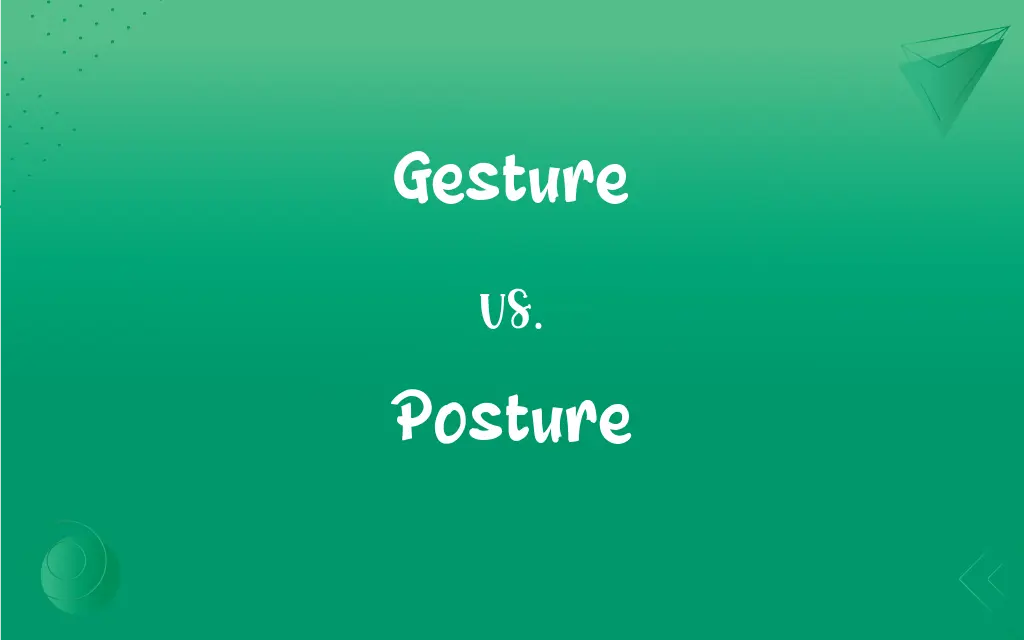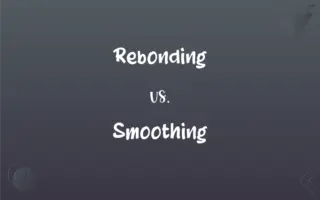Gesture vs. Posture: What's the Difference?
Edited by Janet White || By Harlon Moss || Updated on October 20, 2023
Gesture is a movement expressing emotion; posture is one's body position.

Key Differences
A gesture refers to a deliberate body movement, often made with the hands or arms, to convey a specific meaning or emotion. In contrast, posture pertains to how one holds their body when standing, sitting, or lying down. Both terms are intertwined with body language, but they pinpoint different aspects of human non-verbal communication.
When someone makes a gesture, they're usually trying to communicate an idea or feeling without words. A wave, for example, can signal hello or goodbye. Posture, on the other hand, can reveal a lot about a person's physical health, confidence level, or mood, like how slouching might indicate tiredness or low self-esteem. While gestures are often intentional, postures can sometimes be unconscious reflections of our state of mind.
Understanding gestures is vital in many scenarios, such as interpreting a speaker's intent or navigating different cultural norms. Recognizing postures, however, can provide insights into an individual's well-being or comfort level. Both gestures and postures play significant roles in interpersonal interactions, influencing perceptions and understanding.
When thinking about gestures, one might recall instances like a thumbs-up for approval or a hand on the heart for sincerity. Posture, conversely, brings to mind images of standing tall with confidence or curling up when feeling defensive. These two concepts, though related, offer distinct lenses through which we interpret human behavior.
Comparison Chart
Definition
A movement conveying a message or emotion.
The way one holds their body.
ADVERTISEMENT
Intent
Often intentional.
Can be both intentional and unintentional.
Duration
Typically brief and momentary.
Can be maintained for extended periods.
Body Parts
Primarily involves hands and arms.
Involves the entire body.
Communication
Explicitly conveys specific meanings or emotions.
Can subtly convey moods or health states.
Gesture and Posture Definitions
Gesture
A movement used to express feelings.
He made a sweeping gesture to showcase the vastness of the land.
ADVERTISEMENT
Posture
An attitude or stance regarding an issue.
She took a firm posture on environmental concerns.
Gesture
A sign or action representing a viewpoint.
Her raised fist was a gesture of solidarity and resistance.
Posture
A physical state regarding alignment and support.
A good posture is crucial for spinal health.
Gesture
An act or remark made as a sign of intention.
His kind gesture towards the homeless was commendable.
Posture
The way one positions their body when standing or sitting.
His upright posture exuded confidence.
Gesture
A motion made to convey a message.
She gave a gesture of thumbs-up to show approval.
Posture
A particular position of the body.
The yoga instructor corrected her posture during the exercise.
Gesture
A symbolic action used to communicate.
The audience responded with a clapping gesture.
Posture
A manner of carrying oneself.
His relaxed posture indicated he felt at ease.
Gesture
A motion of the limbs or body made to express or help express thought or to emphasize speech.
Posture
A position of a person's body or body parts
A sitting posture.
The posture of a supplicant.
FAQs
Can posture reveal emotions?
Yes, posture can subtly indicate emotions like confidence, defensiveness, or relaxation.
How does posture affect health?
Poor posture can lead to physical discomfort and long-term health issues.
Is slouching considered a bad posture?
Yes, slouching is often regarded as poor posture as it can strain the spine.
Are facial expressions considered gestures?
Yes, facial expressions are a form of gesture used to convey emotions.
Why is understanding gestures important?
Gestures play a vital role in non-verbal communication and interpersonal interactions.
How can one improve their posture?
Through awareness, exercises, and occasionally using ergonomic furniture.
Do gestures always require movement?
Most gestures involve movement, but some can be static symbols or signs.
Can a gesture be both voluntary and involuntary?
While most gestures are voluntary, reflexive reactions can sometimes be interpreted as gestures.
Can gestures replace verbal communication?
While gestures can enhance or clarify communication, they can't wholly replace verbal interactions.
Why do people often overlook the importance of posture?
People may be unaware of the long-term health implications or the subtle messages posture conveys.
What role does posture play in sports or physical activities?
Proper posture ensures better performance and reduces the risk of injuries.
Are gestures universal across cultures?
No, gestures can vary and may have different meanings across cultures.
Are hand signals considered gestures?
Yes, hand signals are a type of gesture used to convey specific messages.
What's the primary intent behind a gesture?
A gesture primarily conveys a message or emotion.
Can posture impact mental well-being?
Yes, posture can influence mood and confidence levels.
Can gestures be misinterpreted?
Yes, especially across different cultures or contexts, gestures can be misunderstood.
How do cultural differences impact gestures?
A gesture may be interpreted differently or even be offensive in another culture.
In brief, how do gesture and posture differ in communication?
Gesture explicitly conveys messages, while posture subtly indicates mood or well-being.
Is maintaining good posture important while sitting?
Absolutely, maintaining proper posture while sitting can prevent back and neck issues.
How does posture relate to body language?
Posture is a component of body language, offering clues about a person's feelings or state of mind.
About Author
Written by
Harlon MossHarlon is a seasoned quality moderator and accomplished content writer for Difference Wiki. An alumnus of the prestigious University of California, he earned his degree in Computer Science. Leveraging his academic background, Harlon brings a meticulous and informed perspective to his work, ensuring content accuracy and excellence.
Edited by
Janet WhiteJanet White has been an esteemed writer and blogger for Difference Wiki. Holding a Master's degree in Science and Medical Journalism from the prestigious Boston University, she has consistently demonstrated her expertise and passion for her field. When she's not immersed in her work, Janet relishes her time exercising, delving into a good book, and cherishing moments with friends and family.
































































